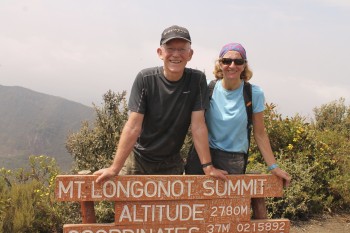SPPC Blog
Lessons from Africa
Professor Scott Murray, GP and St Columba’s Chair of Primary Palliative Care at the University of Edinburgh, shares some of his experiences from a recent trip to East Africa:
 I am just back from amazing two weeks
in East Africa. My son Andrew was taking on a series of epic challenges, which
included running up Mt Kilimanjaro in a day (he took 7hrs 16 minutes from base
camp), doing the same with Mt Kenya, and running over 50km every day for 18
days straight across East Africa.
I am just back from amazing two weeks
in East Africa. My son Andrew was taking on a series of epic challenges, which
included running up Mt Kilimanjaro in a day (he took 7hrs 16 minutes from base
camp), doing the same with Mt Kenya, and running over 50km every day for 18
days straight across East Africa.
My wife Mary and I helped with support, and like Andrew did a bit of running, and went up Mt Longonot (2786 metres) to raise money and awareness for the African Palliative Care Association. (Donations are extremely welcome.)
In addition to seeing some incredible sights (and getting a puncture next to a pride of lions), East Africa offered an opportunity to learn and share knowledge.
 Andrew works
as a Sports Medicine doctor and spent time learning from Olympic Champions,
World Record holders and World Champions to unpick why Kenyans are so good at
distance running- the village of Iten won more medals at the last Athletics
World Championships than China and the UK combined. The universal opinion was it was not due to
genetics, but due to a range of population factors (the Kenyan kids are more
fit and fewer are overweight) and their top athletes’ sheer determination to do
everything it takes to be a champion, maintaining a clear focus and involving
the right people.
Andrew works
as a Sports Medicine doctor and spent time learning from Olympic Champions,
World Record holders and World Champions to unpick why Kenyans are so good at
distance running- the village of Iten won more medals at the last Athletics
World Championships than China and the UK combined. The universal opinion was it was not due to
genetics, but due to a range of population factors (the Kenyan kids are more
fit and fewer are overweight) and their top athletes’ sheer determination to do
everything it takes to be a champion, maintaining a clear focus and involving
the right people.
Our palliative care team in Edinburgh has a UK government grant to help train doctors and nurses in 12 African countries in palliative care, and funds from this run will help ensure there is morphine to be prescribed. The Kenya Palliative Care Association were exceptionally welcoming, and we visited two hospitals to encourage palliative care staff: at Chogoria where I used to work, (see photo of the team there) and in Eldoret near Iten, the village of champions.
For
palliative care to succeed in Africa much effort will be needed due to the lack
of funds for equipment and medicines. But just as in running they have many
resources to call on: neighbours and local communities supporting each-other, a
willingness to face up to the inevitability of death and dying, and spiritual
support from many church groups. Many people are still dying in pain in Africa,
but many countries like Kenya and Uganda are achieving notable successes with
visionaries introducing palliative care
in nursing and medical training, and making morphine available.
We in “developed countries” can learn much from Africa about how neighbours and local communities and churches can support and help people at the end of life die with dignity among their family. We must help individuals and local communities cheer people on at the finishing line of their race. And in the meantime we can help by getting pain relief to people who are suffering unnecessarily by training local leaders to train local staff.
Reflections of a Hospice Chaplain
Reverend Stuart Coates recently retired as Chaplain of Strathcarron Hospice. One of the 'founding fathers' of the SPPC, he has been an active and valued member of SPPC groups and the wider palliative care community throughout his career. Though retired from the Hospice, he continues his role as Chair of the Forth Valley Spiritual Care Committee and his interest in the Cross Party Group in the Scottish Parliament on Palliative Care.
Within this blog, Rev Coates shares some reflections on his 27 years as a Hospice Chaplain in Scotland...
It is hard to imagine that it’s 27 years since I was appointed as first full-time Hospice Chaplain in Scotland!
The normal arrangement for health care chaplains at the time was that they were employed by the Church of Scotland, but Strathcarron Hospice broke new ground by employing me directly. This may seem a small matter, but it turned out to be a pioneering step now implemented throughout healthcare chaplaincy across Scotland, and maybe mirrors the transition of focus from religious care to spiritual care by which chaplaincy has become increasingly characterised.
I have always felt the task of offering spiritual care to be demanding and rewarding in equal measure. My initial mindset was that I might occupy the post for a few years before returning to parish ministry. However, my experience of multi-professional collaboration in palliative care prompted me to feel that this area of work carries a privilege which it would be hard to imagine in other settings.
My learning curve has focused on finding creative space to learn from patients and colleagues how the former’s goals can best be realized. I have been reminded of the qualities of partnership between caring professions which has always had a unique influence on the best kind of holistic care.
I call to mind a Sunday afternoon in December 1991 when a very small number of us gathered in Perth to inaugurate the Scottish Partnership in order to promote these qualities, both professionally and in the shaping of policy for palliative care.
Alongside a growing confidence in the promotion and delivery of spiritual care, the unique place remains for chaplains, in collaboration with religious, community and life stance groups, to ensure that the religious needs of patients, their families and caregivers are addressed.
I have always been fascinated by the manner in which these needs – sometimes along with a patient’s belief or life stance – can be subject to change in the face of crisis or life-threatening illness. The best deployment of spiritual care involves being attuned, sensitive and responsive to this potential for change, and to the opportunities for exploration which a spiritual crisis can bring about.
I guess that the indefinable nature of spiritual care could lead to suspicion - eg: 'what do chaplains actually do?' with consequential questions such as: 'when a chaplain is made privy through pastoral conversation to uniquely personal confidences, what place is there (if any) for these to be shared?'
In reflecting on the latter question I am prompted to consider the meaning of words which we use in this sphere of health care - 'palliative' and its etymological cousin 'chaplain', both derived from the same Latin word pallium = shelter, whereby those undergoing crisis can feel confident of a safe haven for their inmost thoughts and feelings.
Close to the core of the chaplaincy task is a creative inner dialogue balanced between two tasks outlined above: on the one hand of collaborating in a multi-disciplinary team, and on the other of being a repository for people’s stories.